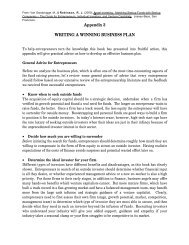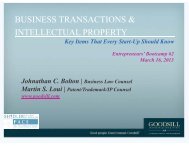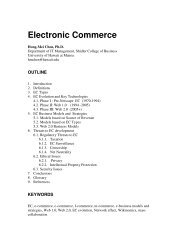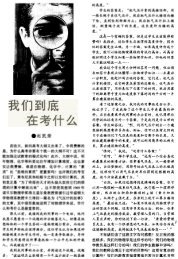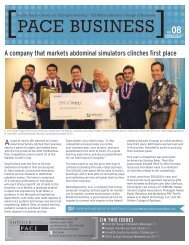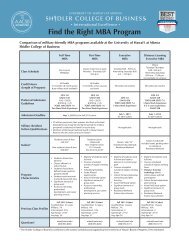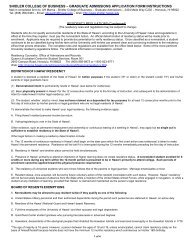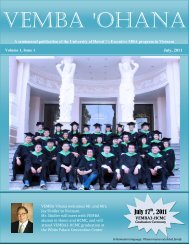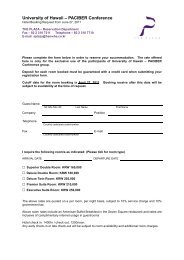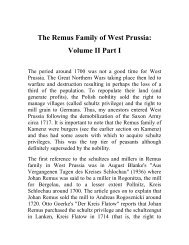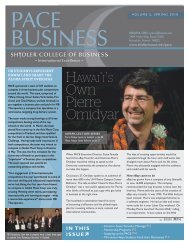February 2013 - Shidler College of Business - University of Hawaii
February 2013 - Shidler College of Business - University of Hawaii
February 2013 - Shidler College of Business - University of Hawaii
You also want an ePaper? Increase the reach of your titles
YUMPU automatically turns print PDFs into web optimized ePapers that Google loves.
Features<br />
Central banks are increasingly asked by their governments<br />
to assume new responsibilities to simulate<br />
the economy; support fiscal imbalances; support<br />
troubled financial institutions; and, support government<br />
industrial policies. This development was well captured on<br />
the cover <strong>of</strong> an August 2011 issue <strong>of</strong> the Economist. The<br />
cover pictures a stagnant world economy as a sick patient<br />
on the gurney surrounded by worried onlookers. A central<br />
banker is shown barging in and announcing “Stand back, I<br />
am a central banker”! In this case, a picture is worth many<br />
words.<br />
These new responsibilities raises many questions because<br />
they make it more difficult for the central bank to focus on<br />
its primary responsibility – low and steady inflation – and<br />
on occasion, serve as a lender <strong>of</strong> last resort.<br />
The issues are even more problematic for central bank<br />
policy in developing countries like Vietnam because they<br />
lack a deep and wide financial system; government industrial<br />
policies play an important role in allocating credit;<br />
there is <strong>of</strong>ten a close relationship between the government<br />
and the central bank; and, the economy is in the<br />
process <strong>of</strong> widespread structural changes.<br />
In our paper, we explore some <strong>of</strong> these issues for Vietnam,<br />
and have come up with four observations and recommendations:<br />
.<br />
First, the State Bank <strong>of</strong> Vietnam has many responsibilities<br />
as defined by the State Bank Law. Fewer responsibilities<br />
and more focus on price stability needs to be considered.<br />
legal or de jure relationship with the government. As <strong>of</strong><br />
this year, the Fed continues to emphasize employment<br />
over price stability. It continues to support the mortgage<br />
market by holding $1 trillion in mortgage backed bonds;<br />
the financial system is permeated with large numbers <strong>of</strong><br />
troubled mortgages that continue to be supported by government<br />
policy; and, the American central bank continues<br />
to support the large fiscal imbalances <strong>of</strong> the government<br />
by keeping interest rates are artificially low levels. Other<br />
central banks face similar issues. The front cover <strong>of</strong> the<br />
Economist was intended for central banks in general.<br />
The article by Cargill and Tuan (VEMBA-HCMC’11) acknowledges<br />
that Vietnam recognizes some <strong>of</strong> these salient<br />
issues related to Vietnam’s effort in economic recovery, and<br />
in the process <strong>of</strong> attempting to deal with some <strong>of</strong> these<br />
problems, has been. willing to listen to outside recommendations.<br />
After all, recognizing a problem is the first step<br />
toward resolution.<br />
by Pr<strong>of</strong>essor Thomas F. Cargill<br />
<strong>University</strong> Nevada, USA &<br />
Nguyen Anh Tuan, VEMBA-HCMC’11<br />
Associate Director, Standard Chartered Bank (Vietnam)<br />
Photo 1. Left to right: Pr<strong>of</strong>essor Bui Tung, Mr. Louis Taylor - CEO Standard<br />
Chartered Bank Vietnam, Cambodia & Lao, Pr<strong>of</strong>essor Thomas F. Cargill & Mr.<br />
Huynh Buu Quang, VEMBA-HCMC’ 11 - HSBC’s Head <strong>of</strong> Asia Pacific International<br />
Global Trade and Receivable Finance at the business seminar on<br />
“Central Independence: Lessons from the U.S. and Implications for Vietnam”<br />
in March 2012<br />
Photo 2. Nguyen Anh Tuan, VEMBA-HCMC’11 - Associate Director, Standard<br />
Chartered Bank (Vietnam)<br />
Second, the institutional design <strong>of</strong> a central bank in terms<br />
<strong>of</strong> whether it is de jure independent or dependent on the<br />
government is less important than if the central bank operates<br />
with a clear rule to focus on price stability. Rather<br />
than make the SBV de jure independent as recommended<br />
by the International Monetary Fund (IMF), it would be better<br />
to have the SBV operate with an inflation target. De<br />
jure independence refers to the formal or legal relationship<br />
between the central bank and the government. A de<br />
jure independent central banki s able to conduct monetary<br />
policy on its own without direction from the government.<br />
Third, there persists a meaningful nonperforming loan<br />
problem in the Vietnam’s financial system that cannot be<br />
solved by monetary policy, but instead, requires structural<br />
changes. Relying on central banks to support nonperforming<br />
loans postpones meaningful reform and makes it less<br />
likely price stability will be achieved.<br />
Fourth, the issues facing Vietnam are not unique; for<br />
example, consider the Federal Reserve (Fed) in the United<br />
States. The Fed has a dual mandate to achieve both price<br />
stability and maximum employment. The Fed is thus not<br />
de facto independent despite its high level <strong>of</strong> de jure<br />
independence because the dual mandate invites political<br />
pressure to emphasize employment over price stability<br />
objectives. De facto refers to “reality” irrespective <strong>of</strong> the<br />
2<br />
4 | VEMBA ‘OHANA



